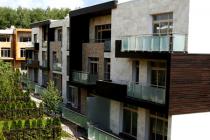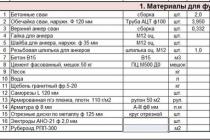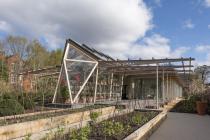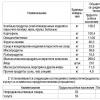To narrow the search results, you can refine the query by specifying the fields to search on. The list of fields is presented above. For example:
You can search across multiple fields at the same time:
logical operators
The default operator is AND.
Operator AND means that the document must match all the elements in the group:
research development
Operator OR means that the document must match one of the values in the group:
study OR development
Operator NOT excludes documents containing this element:
study NOT development
Search type
When writing a query, you can specify the way in which the phrase will be searched. Four methods are supported: search based on morphology, without morphology, search for a prefix, search for a phrase.
By default, the search is based on morphology.
To search without morphology, it is enough to put the "dollar" sign before the words in the phrase:
$ study $ development
To search for a prefix, you need to put an asterisk after the query:
study *
To search for a phrase, you need to enclose the query in double quotes:
" research and development "
Search by synonyms
To include synonyms of a word in the search results, put a hash mark " #
" before a word or before an expression in brackets.
When applied to one word, up to three synonyms will be found for it.
When applied to a parenthesized expression, a synonym will be added to each word if one was found.
Not compatible with no-morphology, prefix, or phrase searches.
# study
grouping
Parentheses are used to group search phrases. This allows you to control the boolean logic of the request.
For example, you need to make a request: find documents whose author is Ivanov or Petrov, and the title contains the words research or development:
Approximate search the words
For an approximate search, you need to put a tilde " ~ " at the end of a word in a phrase. For example:
bromine ~
The search will find words such as "bromine", "rum", "prom", etc.
You can additionally specify maximum amount possible edits: 0, 1 or 2. For example:
bromine ~1
The default is 2 edits.
Proximity criterion
To search by proximity, you need to put a tilde " ~ " at the end of a phrase. For example, to find documents with the words research and development within 2 words, use the following query:
" research development "~2
Expression relevance
To change the relevance of individual expressions in the search, use the sign " ^
" at the end of an expression, and then indicate the level of relevance of this expression in relation to the others.
The higher the level, the more relevant the given expression.
For example, in this expression, the word "research" is four times more relevant than the word "development":
study ^4 development
By default, the level is 1. Valid values are a positive real number.
Search within an interval
To specify the interval in which the value of some field should be, you should specify the boundary values in brackets, separated by the operator TO.
A lexicographic sort will be performed.
Such a query will return results with the author starting from Ivanov and ending with Petrov, but Ivanov and Petrov will not be included in the result.
To include a value in an interval, use square brackets. Use curly braces to escape a value.
Population development and demographic policy. In memory of A. Ya. Kvasha [Electronic resource] : collection of articles / ed. M.B. Denisenko, V.V. Elizarova; Faculty of Economics, Moscow State University named after M.V. Lomonosov. - M.: Prospekt, 2014. - 56 p. - ("Demographic Research". Issue 25). - ISBN 978-5-392-18115-5. - Access mode: http://website/catalog/product/534113 read
978-5-392-18115-5
The collection of scientific articles of the series "Demographic Research" - "Population Development and Demographic Policy" offered to the attention of readers is dedicated to a prominent Russian demographer, a famous scientist, Ph.D. n., Honored Professor of Moscow State University named after M. V. Lomonosov A. Ya. Kvasha. The authors of the collection are colleagues and students of A. Ya. Kvasha. currently working in scientific and educational institutions, in government agencies and public organizations in Moscow, in a number of regions of Russia, in the near and far abroad. The first part of the collection includes a biography of A. Ya. Kvasha. a list of his main scientific works and Ph.D. dissertations carried out under his supervision. The second part of the collection presents the memories of students and colleagues about A. Ya. Kvasha. The third part of the collection contains articles on the subject of those scientific directions, the history of the emergence and development of which in our country is closely connected with the name of A. Ya. Kvasha: demographic analysis and forecasting population policy, economic, social and military demographics. For researchers, graduate students, students and anyone interested in population problems.
The book is included in the collection:
- Collection of Moscow State University. Faculty of Economics
Mikhail Borisovich Denisenko is 50 years old
Biography touches
January 2, 2011 Mikhail Borisovich Denisenko, candidate economic sciences, Head of the Department of Demography at the HSE Institute of Demography, is 50 years old.
 Mikhail Borisovich Denisenko was born on January 2, 1961 in Dessau, Germany, in the family of a military man.
Mikhail Borisovich Denisenko was born on January 2, 1961 in Dessau, Germany, in the family of a military man.
“The first years of my life passed there,” recalls Mikhail Borisovich. “Since then, I have loved red tiled roofs, the smell in cozy cafes and pastry shops, and German speech.
You always want to return to childhood, when your parents were young, when everyone loved and spoiled you. I was the youngest in a large Moscow family with grandmothers, uncles and aunts, and cousins. In the 1960s, there were many more such families in Moscow.
Learned to read early. Every year we traveled a lot on trains. Perhaps that is why interest in geography has awakened. He became interested in politics early. Largely due to the geographical location of the place of residence. Since we lived on Leninsky Prospekt, I had the good fortune to regularly personally greet the first cosmonauts, Fidel Castro and other leaders of "progressive mankind." "Khrushchev's thaw" touched me: about Stalin and Khrushchev already in 1966 he had critical judgments.
 He graduated from school number 176 in Belyaevo. The guys in the class were interesting, the teachers were knowledgeable and demanding. We are still friends with our classmates. Some of them are notable personalities: Volodya Sedov is an art historian, the country's leading historian of architecture, Kolya Alexandrov is a well-known literary critic and popular journalist ("Echo of Moscow", "Culture"), Borya Yeremeev is familiar to those who are interested in cosmetology.
He graduated from school number 176 in Belyaevo. The guys in the class were interesting, the teachers were knowledgeable and demanding. We are still friends with our classmates. Some of them are notable personalities: Volodya Sedov is an art historian, the country's leading historian of architecture, Kolya Alexandrov is a well-known literary critic and popular journalist ("Echo of Moscow", "Culture"), Borya Yeremeev is familiar to those who are interested in cosmetology.
No one, as a scientist, did not represent himself. Since childhood, I dreamed of working only at Moscow State University. M.V. Lomonosov. Favorite subjects at school were geography, mathematics, history. The first time I entered Moscow State University in the 8th grade - the school of young geographers at the Faculty of Geography. The brightest memories. Ideal study. All subjects were favorites, I left each lecture with a huge "bag" of knowledge. On practical expeditions, professional skills and life experience accumulated very quickly. And there were also archaeological expeditions on the Pskov land.
 After graduating from high school, Mikhail Borisovich entered the Faculty of Economics of Moscow State University. M.V. Lomonosov, who graduated in 1983. Then he continued his education, first at the Faculty of Computational Mathematics and Cybernetics with a degree in Applied Mathematics, which he graduated in 1987. In the same year he entered the graduate school of the Faculty of Economics of Moscow State University and in 1992 successfully defended his Ph.D.
After graduating from high school, Mikhail Borisovich entered the Faculty of Economics of Moscow State University. M.V. Lomonosov, who graduated in 1983. Then he continued his education, first at the Faculty of Computational Mathematics and Cybernetics with a degree in Applied Mathematics, which he graduated in 1987. In the same year he entered the graduate school of the Faculty of Economics of Moscow State University and in 1992 successfully defended his Ph.D.
 He began his career, as he dreamed, at Moscow State University. From March 1989 to January 2003 - Senior Lecturer, then Associate Professor of the Faculty of Economics of the Moscow state university. In 1998-2000, he was an employee of the UN Demographics Division (New York). From February 2003 to April 2007 - Head of the Sector of Regional Demography and Human Ecology of the Center for the Study of Population Problems of the Faculty of Economics of Moscow State University.
He began his career, as he dreamed, at Moscow State University. From March 1989 to January 2003 - Senior Lecturer, then Associate Professor of the Faculty of Economics of the Moscow state university. In 1998-2000, he was an employee of the UN Demographics Division (New York). From February 2003 to April 2007 - Head of the Sector of Regional Demography and Human Ecology of the Center for the Study of Population Problems of the Faculty of Economics of Moscow State University.
Trained several times foreign centers: January-June 1996 - Yale University (USA); 1997 - Department of Demography, La Sapienza University (Rome, Italy); August-September 2000 - Business School of the University of Navarra (Barcelona, Spain; May-June 2002 - Department of Demography, University of La Sapienza (Rome, Italy).
From April 2007 to the present - Deputy Director of the HSE Institute of Demography, Head of the Department of Demography at the Higher School of Economics.
The staff of the Institute of Demography and the editors of "Demoscope Weekly" cordially congratulate Mikhail Borisovich on his jubilee, wish him good health, success in his creative and teaching activities and new achievements for the benefit of demographic science.














